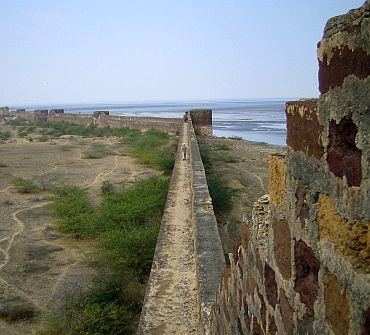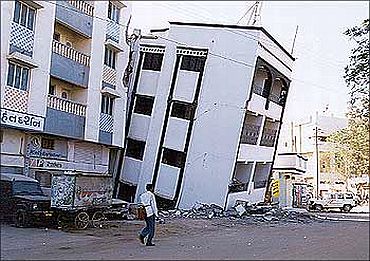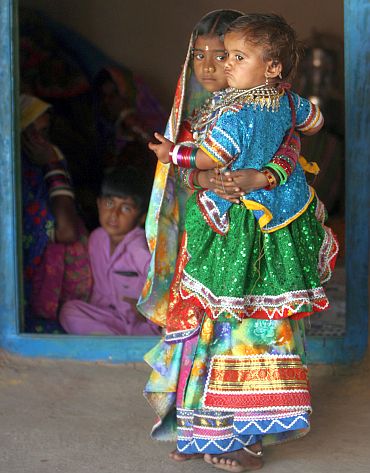 | « Back to article | Print this article |
Why development in Kutch raises questions
Nearly a decade after Kutch faced its worst-ever earthquake, rediff.com's Sheela Bhatt in a two-part series assesses the transformation witnessed in the Kutchi society since the time the calamity struck on January, 2001, and its implications.
Part I: How Kutch was raised from the rubble
There is no denying the fact that there was environment for change in Kutch after the 2001 earthquake. That helped the rehabilitation, increased people's awareness with regard to such a calamity and created the desire for change for one's own sustainability.
But in the process, a lot of unplanned industrial activity sprung up. And it raised many serious questions.
See the entire Kutch coast, which was not the epicentre of the quake but got the money and government support. If the government can carry out rehabilitation with people's participation, why is not the entire coastline being developed in same manner? Why can't industrialisation be made participative?
The development in Kutch disconnects. After the quake, a high degree of people-driven, community-led rehabilitation was witnessed. But now one sees a completely unilateral push for industrialisation. The rehabilitation of Kutch saw percolation of benefits to all strata of society. However, industrialisation has had its impact on the ecological framework and social framework. One visit to Mundra in the Kutch district shows how the story has unfolded there.
Today, the middle class folk find development in Kutch satisfying; to them only personal growth and economics matter. Click on NEXT to read further...
Kutchis have become competitive
Moreover, Kutchis are not resisting change as much. Following the influx of people from other parts, many Kutchis now know more about the world outside Kutch.
The onset of mobile communication has made a huge difference in the development of Kutch. Residents now call up officers to seek information. In Gujarat, cell phone use is widespread. In fact, every family has at least one cell phone.
Kutch has seen its part of calamities. Yet the resolute Kutchis can teach other parts of the country valuable lessons on coping with adverse situations. Since hundreds of years, Kutchis have been very conscious of sustainable development. The way they eat food, their clothes and their homes suggest that they know their environment. In fact, not many know that this is one part of India where chass (buttermilk) is not sold, even today.
But, all that is changing very fast.
'People's approach to life and living has witnessed a sea change'
Five-seven years ago, there was no industry here. Today, it is headlined by pollution.
People identify themselves as part of the "spending economy". It is all about the mindset and not sociology or ecology. Rapid development has brought about rapid change in the people's mindset.
People's approach to life and living has witnessed a sea change. One aspect that stands out is the rampant ghettoisation. Just like Rajgors want to be in the Rajgor neighbourhood, traders, Dalits and Kolis are building homes closer to each other.
It is difficult to say whether this change is government-driven or society-driven. It is a hegemonic matter where lines have totally blurred. But in Bhachau and Rapar, the Koli community is the most affected; they are still on the margins.
The 2001 quake changed everything
Today, artisans' famous Kutchi creation is all money economy oriented. This happens across the country, but in Kutch it is happening at a very fast pace.
The 2001 quake changed everything, including the demography of Kutch.
More than 35000 people have migrated in last few years. Suddenly, things unheard before are occurring -- women don't feel safe; land value has skyrocketed.
And, there is more acceptance of corruption in the Kutchi society. Kutch is the example of 'New India' where the balance of power has changed hands between the State and the industry. Industry has the upper hand here. Development of Mundra is the flagship of the Gujarat story. The perceived power that the State had has been diluted in Kutch!



